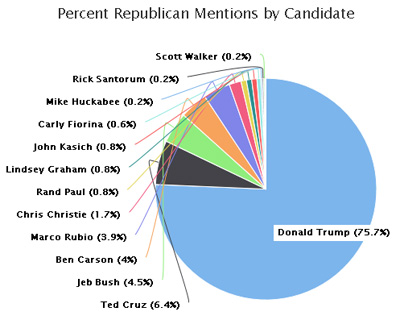Did saturation media coverage of Donald Trump drive his success in the primaries? Reporters swear it didn’t: they were just covering a popular candidate, the same as they always do. Given the immense amount of coverage Trump got, especially from cable news outlets anxious to broadcast his every speech in full,  this is a little hard to take seriously. Trump played the press like a Stradivarius, and they loved every minute of it. Matthew Dickinson brings the evidence to make this case:
this is a little hard to take seriously. Trump played the press like a Stradivarius, and they loved every minute of it. Matthew Dickinson brings the evidence to make this case:
What about the argument that the media coverage followed Trump’s popularity rather than inspiring it? Importantly, the heavy media focus on Trump began before his rise in the polls and in the absence of other traditional indicators of candidate strength, such as campaign fundraising prowess. That’s suggestive of media influence, but research also backs up the idea that causality runs in that direction.
For both the 2012 and 2016 Republican presidential races, political scientists Kevin Reuning and Nick Dietrich analyzed daily data from the start of election polling up to the Iowa caucus. They looked at public interest in candidates (gauged by online searches), polling support for candidates, and media coverage on major cable news stations. They found that increased media coverage influenced the polls — not vice versa.
Trump borrowed the insight that used to power Ann Coulter’s book promotions before everyone got tired of her: anything suitably outrageous will get media attention. Today, this works far better than it ever did for Coulter. Outrageous stuff routinely drives social media into a frenzy, and old media’s current infatuation with new media meant that anything going viral online almost automatically became news all by itself. Trump rode this editorial gullibility to the Republican nomination, and maybe to the White House.
Will it ever work again? I doubt it. Eventually, digital outrage will wear out its welcome and social media will move on. Alternatively, old media will finally figure out that social media isn’t its salvation—and that several thousand bored folks spending a few seconds each to express an opinion isn’t news anyway. Either way, this is a moment, not a sign of the future.

















